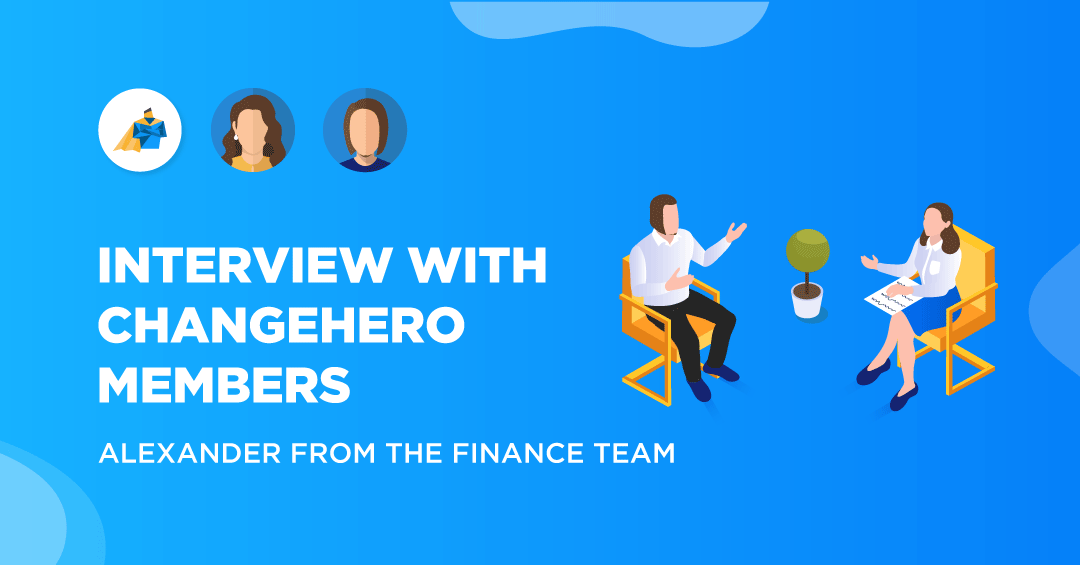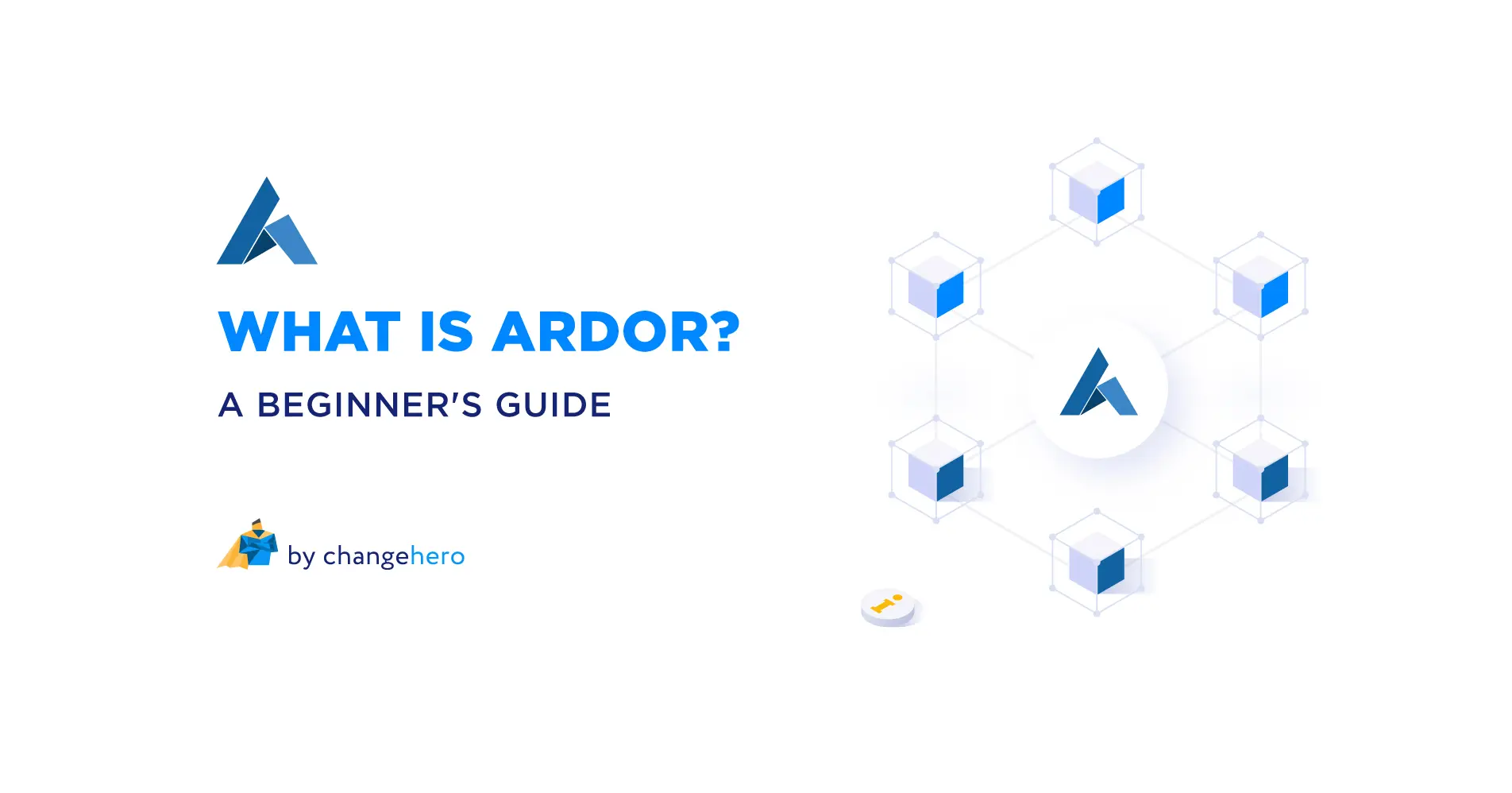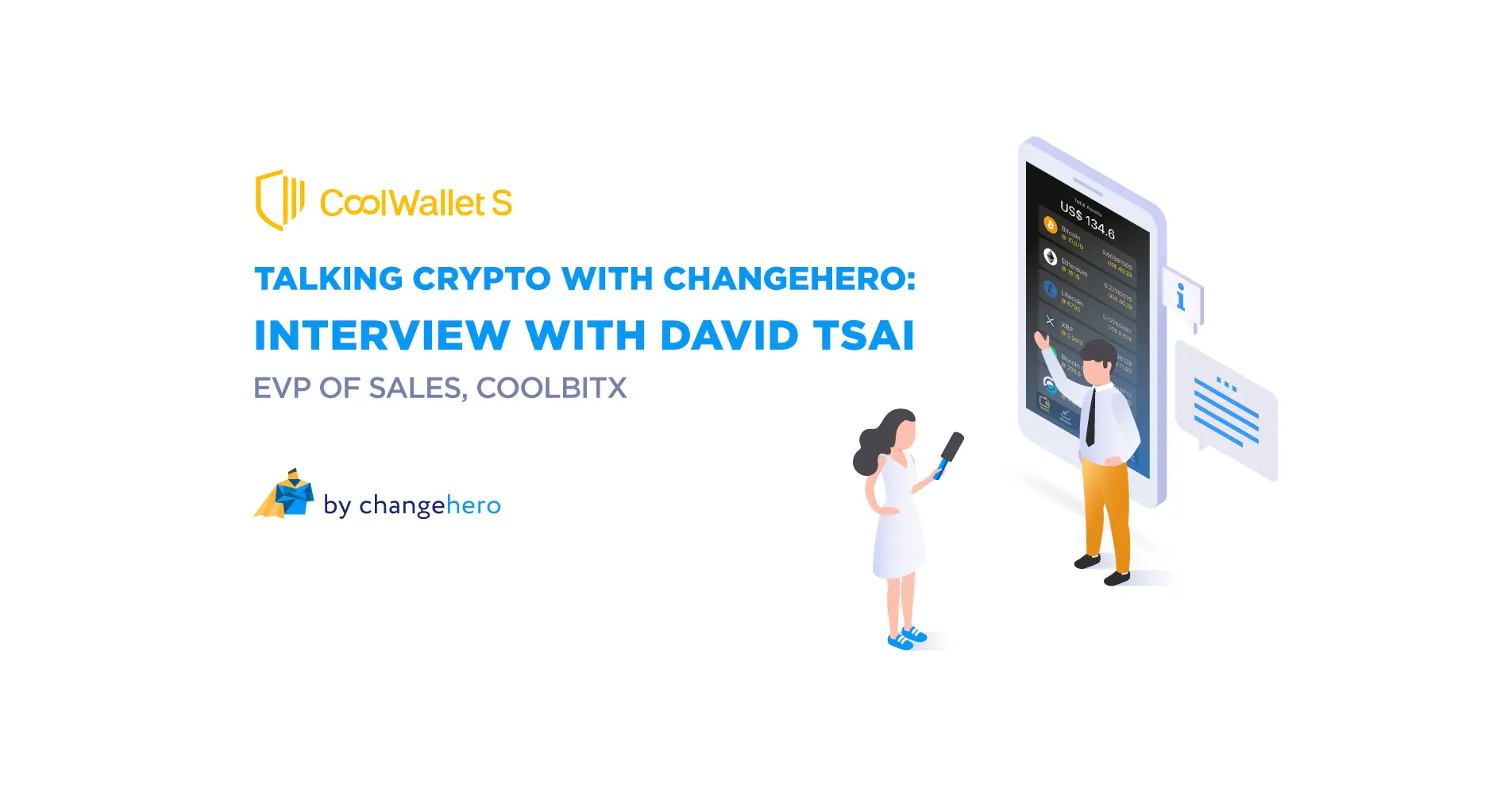For today’s interview, we invited Francisco Sarrias, Senior Sales Engineer of Jelurida. They are responsible for the development of the ecosystem that encompasses Ardor and Ignis, as well as maintenance of the Nxt blockchain. Just like Nxt was the pioneer in implementing Proof-of-Stake, in the same way, Ardor is pioneering new use cases as a Blockchain-as-a-Service with the parent-child chain architecture thanks to Jelurida.
On behalf of the company, Francisco shared with us what it is like to work in the crypto industry today, what challenges Jelurida faces and how they are overcoming them, as well as provided insights in blockchain technology firsthand. We highly suggest you to get comfortable and enjoy the talk!
Introduction
ChangeHero: Jelurida, Ardor, Nxt, Ignis - Sounds like they are from a Sci-Fi film. Is there any interesting story behind these names?
Francisco Sarrias (FS): Yes, sure. NXT ($NXT) was our first cryptocurrency born in 2013 when almost all alt coins were clones of the Bitcoin code. NXT blockchain software was written from scratch in Java and implemented the Proof of Stake consensus algorithm successfully for the first time in history. Its name means that NXT is the “next” thing after Bitcoin.
Jelurida is the name of the company that the core developers of NXT founded in 2017 to protect and promote the NXT technology. Its name comes from the nicknames of the founders: JEan, LUc, RIker, DAmelon.
Ardor ($ARDR) is the name of the cryptocurrency and multi-chain architecture blockchain launched in 2018 by Jelurida as a new version of NXT with the capability of having child chains (or shards) for each customer or application. This is revolutionary because it lets solve the blockchain scalability problems that other single-layer networks suffer from nowadays. The definition of “ardor” is “extreme vigor or energy“.
Ignis is the name of the first child chain in Ardor and its native cryptocurrency ($IGNIS). Ignis allows anyone to create their tokens and market them in its integrated decentralized cryptocurrency exchange (DEX) without coding, just using an intuitive web wallet. The definition of “ignis” is “a light that sometimes appears in the night”. Ignis is the light that makes smart contracts available to non-tech savvy people, everyone can enjoy powerful preprogrammed smart contracts in the platform just using the computer mouse.
ChangeHero: Can you give our readers a quick intro to the projects?
FS: [NXT] was born as a blockchain for solving the energy waste and difficulty of use of Bitcoin and its clones. First, it was led by a community of enthusiasts but when some of the members of the community left the boat to launch their own projects based on NXT learnings (Lisk, New, Komodo, Iota, etc), it was clear that there was the necessity to evolve the community leadership into a corporation that could ensure the future of the technology, and then Jelurida company was born.
Jelurida launched an ICO in 2017 to raise funds for financing its operations, and as a result of that in 2018 Ardor and Ignis were born, leveraging the innovations of NXT and going forward by implementing in production a scalable architecture that could meet the demand for real world use cases.
Back to the Beginnings
ChangeHero: When did you first hear about blockchain? What was your initial reaction to it?
FS: In 2016 I owned a small web hosting company when cloud computing went mainstream.
I was trying to make some profit from all the hardware and datacenter space I already invested in, and this is how I discovered cryptocurrencies.
I was shocked when I learned about NXT, a crypto that did not need expensive mining because it was based on the Proof of Stake algorithm. As I have been always concerned about protecting the environment and the development team was amazing, I quickly became part of the NXT community.
ChangeHero: What made you realize that it was time to start Jelurida? What was the motivation behind it?
FS: Until 2017, all developing and marketing efforts of NXT were done on a voluntary basis and rewarded with donations. It made some of our community developers leave the boat to launch their own projects financed by ICOs. Then we came to the conclusion that we needed our own ICO to keep NXT evolving.
On the business development side, we were approached by some banks and corporations that were interested in our technology stack, but most of them were scared to deal with a community-driven project, they wanted someone to be able to sign contracts.
Also our code was being copied without respecting its original developers wishes, we could not establish a proper software license without being a legal entity. It was clear that we had to structure us as a company to solve all these issues.
ChangeHero: Did you face any challenges during the process of bringing things together in Jelurida? How did you cope with them?
FS: Yes, being a blockchain development company financed by an ICO is quite a tricky experience, especially because banks are reluctant to offer you their services like having a bank account. Then there is the accounting and taxing bureaucracy, we spent a lot of time and money before we could set up the right administrative structure.
Of course, we had some community members promote to company employees with most of our team working remotely from different time zones. It took some time to make the machinery work smoothly and some initial members left because they could not adapt to this innovative company model.
The Covid-19 crisis has forced most businesses to use telework intensively, but we have walked that path from the very beginning of the company, so we are now two years ahead on this flexible organization paradigm. Though, we’re still learning how to improve it and make it more productive and satisfying for our team members.
ChangeHero: How does an average consumer benefit from blockchain tech? Or does it benefit only the companies?
FS: The recent hacks of Twitter and data leaks from Facebook show how fragile are centralized organizations in the Internet era. They are subject to security risk, privacy violation and worst of all, malicious actors interference. Blockchain tech has the potential to make most organizations more transparent and ensure no one can abuse them to their own selfish interests. Decentralization and openness are the only real weapons we have against the security and manipulation threats of this complex world where everybody and everything is connected, and this concerns both companies and consumers.
ChangeHero: What is your opinion about other blockchain projects? Whom do you see as competitors?
FS: We have a lot of respect for other projects with a real developing team behind them trying to bring the latest state of the art to a production mainnet.
Unfortunately, when you look at Coinmarketcap, sixty percent of the top capitalization cryptos are either pure bitcoin clones with no real innovation behind them, ERC-20 tokens that are simple speculative instruments, plain Ponzi schemes or altcoins which simply see no development for months.
Competition is very healthy for the blockchain environment and we can all learn from each other. But market speculation confuses an uninformed investor that puts their money into dead coins or into pump and dump schemes.
In 2018, Jelurida launched the first multi-chain network which allows sharding of networks and applications. It is running on the same Proof-of-Stake consensus algorithm that NXT has been using for seven years now and has an incredible lightweight smart contracts framework in Java that helps avoid gas collapse altogether. So basically, it has everything that Ethereum 2.0 is trying to make a reality unsuccessfully. And given that they are still much better known than we are, you realize that hype and marketing in the crypto space is much more important than robust and good technology, we need to learn this lesson.
Let’s Talk Business
ChangeHero: In your opinion, what kind of businesses would be able to get the most out of Blockchain as a Service (BaaS)? Also, what industries would’ve employed blockchain technology earlier?
FS: We believe financial services is where disruption will happen sooner as we can now see with the DeFi craze. Tokenization of assets and programmable money are incredible tools to build a new financial system worldwide.
Of course, blockchain is very interesting in other fields like identity, logistics, document certification, voting etc, but the immediate revolution will happen in what makes the world go around: money.
ChangeHero: Tech giants like Microsoft and Amazon have also recently entered the BaaS market. How would this affect Jelurida? What makes your project different from the rest?
FS: These companies are selling their cloud services so their customers still need to figure out how to organize a blockchain on them. What we offer is a child chain or shard or “virtual blockchain” where you do not need to establish the consensus between your nodes of infrastructure because you profit from the consensus of the Ardor parent chain. Our proposal could be defined as “Consensus as a Service” instead of “Blockchain as a Service” because we save our customers the burden of ensuring the blockchain is not hacked or attacked, providing the security of their own blockchain will be the same grade as the parent chain Ardor. That means that the more child chains are added to the platform, the more secure the consensus will be, because it will incentivize people to run their own nodes and contribute to the security of the parent blockchain with their ARDR stake. Remember that more child chains means more transaction fees to the forger nodes, so that also makes the number of nodes increase, and thus improves the security of the network for all child chains.
In a traditional BaaS model like Azure and Amazon, your blockchain security depends on the money you’re supposed to pay to these hosting providers for having more nodes running. In Ardor, each child chain adds security to the rest of child chains.
You could see Ardor’s model as a decentralized hosting service, because the nodes are run by independent individuals or companies. Their incentive is the transaction fees they earn from all of the child chains joining the Ardor multichain.
ChangeHero: Nxt is the first blockchain to use the PoS consensus and now many platforms are upgrading their network to it. What do you think caused this shift? Do you think there is any possibility of a new kind of consensus appearing in future?
FS: There are several consensus algorithms but PoS has the advantage to be truly decentralized, other platforms use Delegated PoS, Proof-of-Authority or even convoluted combinations of PoS and BFT (Byzantine Fault Tolerance). We believe that there is no single blockchain that fits all applications, and the same goes for consensus algorithms. Maybe for certain applications like private blockchains, PoS is not the best fit, but for public networks like Nxt and Ardor, PoS has demonstrated to be a secure and reliable consensus algorithm.
ChangeHero: You have a global presence with good communities in Africa and Korea. Do you plan to expand to more Asian countries, especially to China with their government leaning towards blockchain technology?
FS: Yes, in fact we have a collaboration with a company in China that is helping us to reach the community there and we participate in standardization working groups in international organizations like the ITU (International Telecommunications Union) together with representatives of prominent Chinese companies. Unfortunately, the official position of the Chinese government right now is to favour permissioned blockchains instead of open public platforms like Ardor, Ignis and Nxt. In fact, we are in talks with China’s BSN blockchain initiative to include our technology stack there, but for the moment they are only open to do so for their international customers. Chinese companies will only have access to private blockchains without tokens, but hopefully this will change in the future.
ChangeHero: Lately, we find more and more financial firms looking towards the blockchain. Will we be able to see any partnerships with traditional banking firms in future?
FS: Traditional banking firms are years away to have a welcoming attitude towards cryptocurrencies. They are using internally permissioned blockchains for improving their own operations but anything open, public and transparent causes an allergic reaction in their management boards.
I am not sure if this is caused by fear from the regulatory bodies or because they believe they could lose their monopoly as custodians of people’s wealth or simply because their top management is happy with the current status quo.
The fact is that most brilliant professionals from the crypto space hired by the traditional banks leave their job after they work there for a couple of years, so probably the space will be disrupted by new players that are not afraid of embracing new business models, like it already happened in the music, publishing and entertainment industries.
ChangeHero: At the moment, Jelurida appears to be a huge ecosystem. Do you have any plans to extend this? Would we be able to see new child chains or products from it in future?
FS: The way our business model is conceived makes the initial development of the ecosystem slow, but once the number of child chains increases, there is snowball effect on all fronts: an increase in transaction fees in the network so the number of nodes increases, the return on our tokens investment goes up, the number of cryptocurrency exchanges that want to include our wallet increases to list the new child chain tokens, the number of developers familiarized with our API multiplies and thus that makes it easier for them to reuse their code for new dApps.
On September 22, we will have a hard fork to launch the new child chain token $GPS of Triffic App: a very amusing mobile application that will be used by retail stores to increase their traffic to their business. This kind of consumer-oriented app will be an incredible source of transactions for our network.
Of course, we have other child-chains in the pipeline that we will announce probably before the end of the year.
ChangeHero: Can you tell us about a tough day you had at work and how you pushed through it?
FS: We are a very well organized company and our management is very helpful when anything goes wrong so I cannot remember a day when things went out of control or I felt overwhelmed.
My only points of pain connected with my work in the company come from the community channels, where there are some individuals that do not care about the hard work we do at the company and they are only interested in the price of our tokens in the market. We are here for the long run and we will not participate in pump and dump schemes or artificially generating yield for our tokens coming from thin air.
ChangeHero: What is the work environment like? How would you describe the culture in the industry?
FS: I see a big divide between projects in the crypto space. There are projects led by reckless developers that do not care to dump their tokens or abandon the project right after they have collected enough money from their investors or they just become bored of it, and serious teams like ours, with a clear technical and commercial roadmap.
Probably, the best strategy to try to do a quick buck will be supporting those unstable projects and exit before the building crashes but if you care about revolutionizing the world through crypto and blockchain, it will take more than six months to achieve, so better be prepared to learn about the tech and team behind the tokens where you put your savings and do not watch CoinMarketCap every quarter of hour.
Rapid Round
ChangeHero: Pick one of the two options for each question.
ChangeHero: Build or Trade?
FS: No comment.
ChangeHero: PoW or PoS?
FS: PoS, of course, this is where people want to go and we have been there since 2013!
ChangeHero: Ardor or Nxt?
FS: Making me choose between Ardor, Nxt or Ignis is like asking me which of my three kids I love more.
Plans for the Future
ChangeHero: Ardor hardfork is scheduled for September 22. Will we see any significant changes in the chain? Please share with us a few of the exciting ones.
FS: The main change, as I mentioned before, is the activation of the GPS child chain for the Triffic App. I encourage everybody to download the App to their smartphone to find out how disruptive it is.
ChangeHero: What does the roadmap for Jelurida look like?
FS: We will publish an updated roadmap soon, please follow our communication channels for any updates.
ChangeHero: Finally, to wrap it up, where do you see the industry heading to?
FS: I see a convergence between cryptocurrencies and open blockchains with permissioned corporate frameworks. I see a world of different blockchain technologies applied to specific use cases talking to each other through interoperability standards, like the ones we are contributing to in different international working groups.
We would like to thank Francisco for taking his time and providing us with his valuable insights and honest opinions. We also wish Jelurida best of luck in developing their services, and will be looking forward to their next updates!
And we will be keeping you informed about the most interesting news and events in the crypto space through our blog and social media, so make sure to subscribe! Find ChangeHero on Twitter, Facebook, Reddit and Telegram.





